11 Section 1-11: Present Tense–Regular Verbs
1–11: Present Tense—Regular Verbs
So far, you have learned how to conjugate the verbs sein and haben, the two most important verbs in the German language. Both of them are irregular, and their conjugations had to be memorized. Most other verbs in German are not irregular and have a set pattern of endings.
What is verb conjugation in English? Putting certain endings on verbs so that they match up with their subjects!
As a native English speaker, you may not realize that you conjugate verbs every day when speaking. Compare the following sentences:
- I play basketball. (No ending on “play”)
- She plays basketball. (-s at end of “play”)
If you grew up learning English, you probably don’t notice that you automatically do this; you naturally can sense what sounds correct when speaking.
Below are some common regular verbs in their infinitive form (aka. unconjugated form. All German infinitives end in –en (99% of all verbs) or -n (<1%).
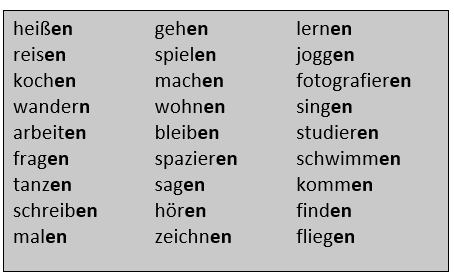
You have already memorized a few phrases that had conjugated verbs in them. You may have wondered why the ending of the verb changed in different sentences.
- Ich komme aus Berlin. I come from Berlin.
- Er wohnt in England. He lives in England.
- Sie heißt Sophia. She is called Sophia.
The infinitive (unconjugated form) of each verb has two parts. We will use the verb lernen as an example.
Stem: lern–
Ending: –en
In German, the following verb endings are used for the present tense of regular verbs.
|
ich→-e |
wir→–en (same as infinitive) |
|
du→ –st |
ihr→ -t |
|
er/sie/es→ -t |
sie/Sie→ -en (same as infinitive) |

How to conjugate a German verb.
Step 1: Take off the ending (-en or -n).
Step 2: Add a new ending that matches the subject.
Let’s try it with a few verbs from the list.
|
Conjugate reisen for “ich.” |
Conjugate singen for “du.” |
|
Step 1: Take off the –en→ reis- |
Step 1: Take off the –en → sing– |
|
Step 2: Add the new ending→ –e |
Step 2: Add the new ending→ –st |
|
Conjugated verb: Ich reise. |
Conjugated verb: Du singst. |
Click the link to watch me reteaching this.
Ex. A: Verben. Use the steps for conjugating verbs to complete the tables below.
|
Conjugate spielen for “wir.” |
Conjugate machen for “du.” |
|
Step 1: |
Step 1: |
|
Step 2: |
Step 2: |
|
Conjugated verb: |
Conjugated verb: |
|
Conjugate bleiben for “er.” |
Conjugate schwimmen for “Sie.” |
|
Step 1: |
Step 1: |
|
Step 2: |
Step 2: |
|
Conjugated verb: |
Conjugated verb: |
|
Conjugate fragen for “ihr.” |
Conjugate joggen for “sie” (sing.) |
|
Step 1: |
Step 1: |
|
Step 2: |
Step 2: |
|
Conjugated verb: |
Conjugated verb: |
|
Conjugate gehen for “ich.” |
Conjugate schreiben for “er.” |
|
Step 1: |
Step 1: |
|
Step 2: |
Step 2: |
|
Conjugated verb: |
Conjugated verb: |
Video. Easy German: Conjugation of Regular Verbs “sagen,” “machen,” “hören.” Watch to see some examples of these verbs conjugated.
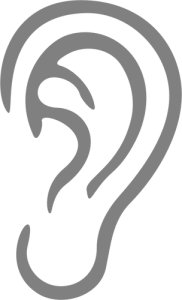
QUICK LISTENING: Listen to Johanna (AudioLingua) introduce herself and mention a few of her hobbies. How many new verbs do you recognize?
Ex. B: Now try conjugating some verbs for all forms. Fill in the tables below.
- kochen—to cook
|
ich |
wir |
|
du |
ihr |
|
er/sie/es |
sie/Sie |
2. fotografieren—to take pictures
|
ich |
wir |
|
du |
ihr |
|
er/sie/es |
sie/Sie |
3. wandern—to hike (think „wander” around)
|
ich |
wir |
|
du |
ihr |
|
er/sie/es |
sie/Sie |
4. hören—to hear, listen to
|
ich |
wir |
|
du |
ihr |
|
er/sie/es |
sie/Sie |
The present tense in German is equivalent to three different ways of expressing the present tense in English. The sentence “Ich lerne Deutsch” could be translated as follows.
- I learn German.
- I am learning German.
- I do learn German.
COMMON MISTAKE: As English speakers, we tend to translate word-for-word into German. This can lead to mistakes in German, because German does not have the present progressive tense (i.e. is learning, am dancing, are playing). Often, that results in the following mistake:
ENGLISH→I am playing.
WRONG→ Ich bin spielen.←WRONG
CORRECT→Ich spiele.
Whenever you want to translate something into German that has is/am/are + verb+ing in English, reword it so that it sounds simpler.
- He is hiking.
- REPHRASE TO He hikes.
- Translates to Er wandert.
Studieren vs. lernen:
The verbs studieren and lernen are often confused because they sound so much like verbs in English.
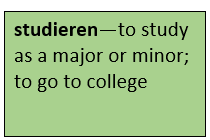
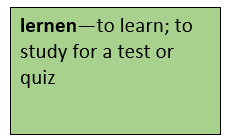
Beispiele:
- Was studieren Sie? What are you majoring in?
(Audio courtesy of Wikimedia user Jeuwre, Creative Commons Attribution-Share Alike 4.0 International .)
- Ich lerne Japanisch. I am learning Japanese.
- Wo studierst du? Where do you go to college?
- Er lernt für ein Deutschquiz. He is studying for a German quiz.
- Sabine studiert Musik. Sabine is majoring in music.


QUICK LISTENING: Listen to Aaron, Sebastian, Marieke, and Jule (AudioLingua) talk about what they’re majoring in. Which subjects do you hear?
Check out Dr. Claudia Kost’s and Crystal Sawatzky’s (University of Alberta) flashcards to learn more about a few majors in German:
Ex. D: Using the subjects listed below, talk with a partner about whether you are majoring in these subjects or just learning them this semester (or in your free time.)
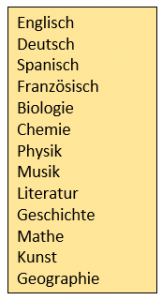
A: Was studierst du?
B: Ich studiere _________ (und ________.)
B: Was lernst du?
A: Ich lerne _________.
A/B: Ich studiere _________. Ich lerne _______, ________ und __________.
Nach vs. zuThe verbs reisen, gehen, fliegen, kommen, and joggen are verbs of motion. You can use them to say where you plan to go.
- To say that you are going to a city, state, country, or home, use the preposition nach.
→Wir reisen nach Dänemark. (country)
→Er fliegt nach Hause. (home)
- To say that you are going to see a person or a business with a proper name, use the preposition zu.
→Wir gehen zu Lena. (person)
→Der Student joggt zu Aldi. (store’s proper name)
- To say that you are at home (i.e., not going home) use the expression “zu Hause.”
→Morgen bleiben wir zu Hause. (at home)
→Ich arbeite zu Hause. (at home)
COMMON MISTAKE!!!
Students often confuse the word das Haus with the phrases „zu Hause“ and „nach Hause.“ Whenever you are talking about a house, use “das Haus.” If you are talking about going home or being at home, use “nach Hause” or “zu Hause.” The –e at the end of these phrases comes from German several centuries ago. It is only used in these two phrases.
Click to see me reteaching nach vs. zu:

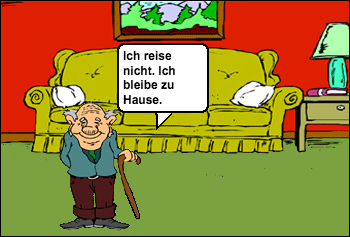
QUICK LISTENING: Listen to the description of a kindergarten teacher’s day at work. You won’t understand all the words, but you will hear several new verbs from this section. Fill in with the missing verbs as you listen. (Used with permission from Germanlistening.com).
Verbs with stems ending in -d or -t.
If a verb’s stem ends in -d or -t, often an extra “e” gets added to its conjugation in the du and er/sie/es form to make it easier to pronounce.
- arbeiten Du arbeitest. Er arbeitet.
If this extra -e- were not added between the stem and the ending, it would be very hard to pronounce.
INCORRECT→ Du arbeitst. Er arbeitt. ←INCORRECT!!
- finden Er findet Deutsch cool.
- schneiden Ihr schneidet das Papier.
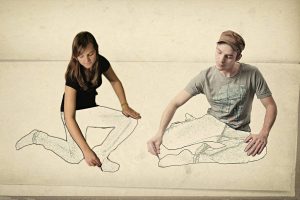
Er zeichnet und sie zeichnet; sie zeichnen.
Click the link to see me reteaching verbs with stems ending in -d or -t:
Ex. H: Wie findest du Geschichte? Ask your classmates their opinions on the following subjects. ![]()
A: Wie findest du Informatik?
B: Ich finde Informatik schwierig.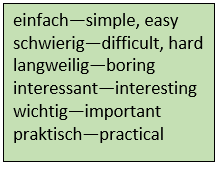
- Biologie
- Psychologie
- Geschichte
- Deutsch
- Englisch
- Informatik
- Mathematik
- Musik
- Geographie
Verbs with stems that end in an “s” sound.
Verbs whose stems end in -ß or -z, often don’t add the “s” from –st when conjugated for “du.”
Beispiel: du/heißen→Du heißt.
(NOT „Du heißst“ because „ß” is the same as “ss.” That would give us “Du heissst”—too many of the letter “s”!)
Beispiel: du/tanzen→Du tanzt.
(NOT „Du tanzst“ because „z“ already makes an „s“ sound.)
Click to watch me reteaching verbs with stems ending in -s sound:
Take a moment to do Dr. Claudia Kost’s and Crystal Sawatzky’s (University of Alberta) activity to see how well you know the meanings of the verbs you’ve learned in this section:
Gern + infinitive
To say that you like to do something, add gern to the conjugated verb.
Ich zeichne. BUT Ich zeichne gern.
(I sketch.) (I like to sketch.)
Erika spielt Tuba. BUT Erika spielt gern Tuba.
(Erika plays tuba.) (Erika likes to play tuba.)
Mein Bruder tanzt. BUT Mein Bruder tanzt gern.
(My brother dances.) (My brother likes to dance.)
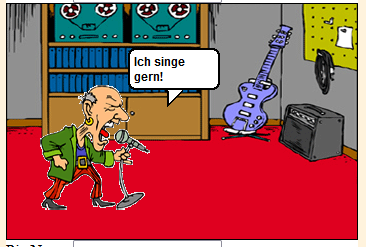
Officially, the word gern is an adverb that means “gladly,” but we translate it in common English to mean “like to.”
Just as we negate adjectives by putting nicht in front of them, we do the same for adverbs. To negate gern, we put the word nicht in front of it.
Ich tanze nicht gern. (I don’t like to dance.)
Click the link to watch me reteaching gern:
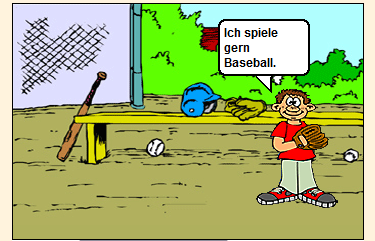
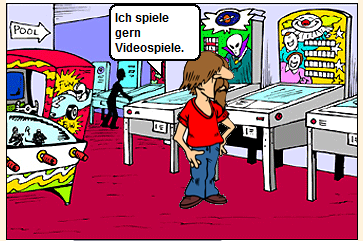
Ex. K: Was machst du gern? What do you like to do?
A: Was machst du gern?
B: Ich ___(conjugated VERB)________ gern.
A: Was machst du nicht gern?
B: Ich ___(conjugated VERB)________ nicht gern.
Now kick this exercise up a notch to review everything you have learned so far with Speed Dating in German! Split the group into two halves. One half will form a small circle. The other half makes a circle around these students. Each finds a partner and they will have a conversation as if they are just now meeting each other.
- Name
- Age
- Major-what you are studying
- Describe yourself with adjectives.
- Tell what you like to do and do not like to do.
After each round, the outer circle will shift to the right and find a new partner. Make sure to use connecting responses to sound more natural, such as…
- Ich auch! (Me too!)
- Ich auch nicht. (Me either)
- Interessant!
Check out Dr. Claudia Kost’s and Crystal Sawatzky’s (University of Alberta) activities with more examples of freetime activities:
Ex. L: Partnerarbeit. Now ask your classmates what they do and don’t like to do, using the verbs below.
Beispiel: reisen
A: Reist du gern?
B: Ja, ich reise gern. ODER Nein, ich reise nicht gern.
- kochen 8. zeichnen
- wandern 9. lernen
- tanzen 10. joggen
- arbeiten 11. fotografieren
- schreiben 12. singen
- malen 13. studieren
- spazieren 14. schwimmen
Ex. M: Kleiner Absatz! Using your answers from Ex. L, write a brief paragraph about the people you interviewed and what they like to do (or not do.) Write 7-8 sentences.
Beispiel: Angela kocht nicht gern. Sie wandert sehr gern…usw.
Here are some sports, instruments, and games you might enjoy playing. Most of them are very similar to English.
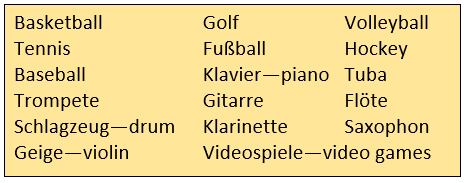
The verb spielen can be used with sports, instruments, and games. Check out this diagram with more instruments (courtesy of Claudia Kost & Crystal Sawatzky (University of Alberta.)
Ex. N. Was spielen Sie gern? Was spielen Sie nicht gern?
Ich spiele gern ___________. Ich spiele nicht gern __________.
Ex. P: Was machen diese Menschen? Write a complete sentence to describe what these people are doing. Some pictures may have more than one possible answer.
Beispiel: 
→Er wandert.
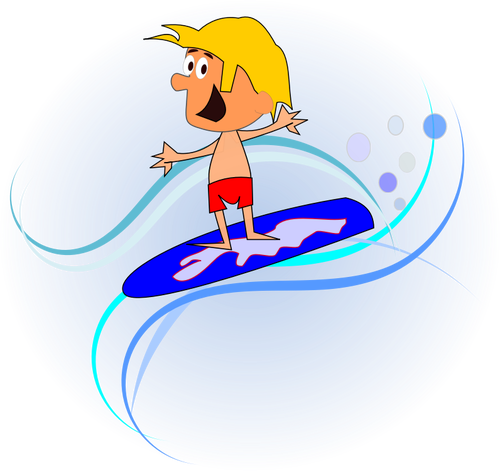 4.
4. 
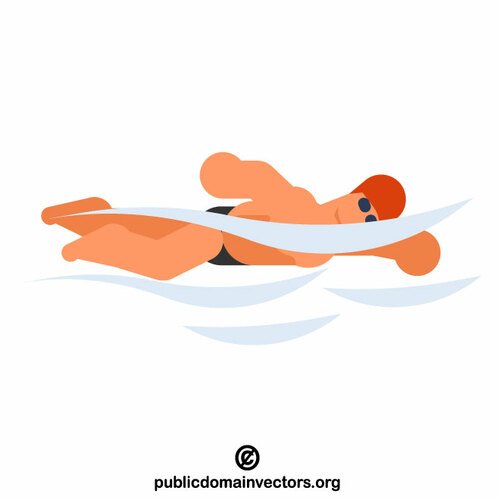 5.
5. 
5.  6.
6. 
EXTRA PRACTICE: Try Dr. Claudia Kost’s and Crystal Sawatzky’s (University of Alberta) extra verb conjugation exercises for extra practice:
EXTRA PRACTICE: Germanzone.org’s website has plenty of conjugation practice.
- https://www.germanzone.org/present-tense-common-verbs-2-2/.
- https://www.germanzone.org/present-tense-common-verbs-3/.
- https://www.germanzone.org/present-tense-regular-verbs-1/.
- https://www.germanzone.org/present-tense-common-verbs-1-2/.
- https://www.germanzone.org/present-tense-regular-verbs-2/.
- https://www.germanzone.org/present-tense-common-verbs-4/.
The following exercises have the verbs already conjugated; you will need to supply the correct subject pronoun to match up with the conjugation.
- https://www.germanzone.org/german-subject-pronouns-1/.
- https://www.germanzone.org/german-subject-pronouns-2/.
Click on the link and scroll to the bottom of the page to see some extra practice conjugating regular verbs in the present tense. You can set your level for easy, medium, or hard.
Finally, read the following paragraphs by Dr. Claudia Kost and Crystal Sawatzky (University of Alberta) and click on all the freetime activities you find.
Ex. Q: Video. Nicos Weg. Folge 6. Das ist Nico. Watch the video and do the online activities associated with it. You will hear several new words in this video.
Video. Easy German: Introduce Yourself in German

